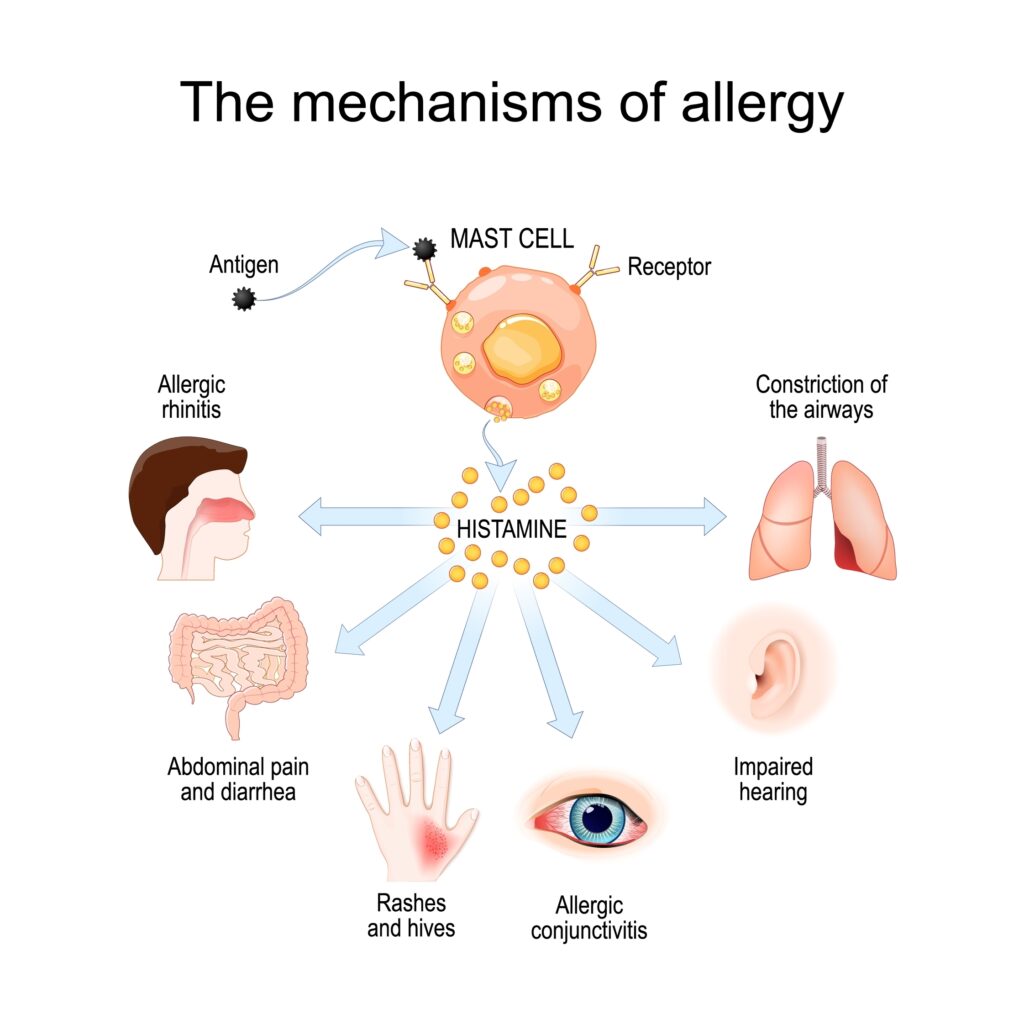
Do you keep on sneezing and sniffling? Are your eyes watery and itchy?
You may have allergies. Allergies can be bothersome and cause uncomfortable symptoms like a stuffy nose, sneezing, and itchiness. They can also lead to sinus problems.
Keep reading to learn more about allergies and sinus problems, their connection, and their treatment options.
What are Allergies?

Allergies are an immune reaction or response to environmental substances that are typically not harmful to most people. These substances are known as allergens and include:
- Mold
- Latex
- Pollen
- Dust mites
- Pet dander
- Cockroaches
- Insect stings, such as from a wasp, bee, or hornet
- Some medications like penicillin, naproxen, or ibuprofen
- Certain foods like fish, soy, eggs, tree nuts, milk, peanuts, wheat, or shellfish
Why Do Allergies Develop?
Your immune system works hard to protect your body from foreign, disease-causing substances like viruses, bacteria, and parasites. But sometimes, it mistakes allergens as dangerous intruders and tries to eliminate them as it would harmful substances.
If you have an allergy, when you’re first exposed to a specific allergen, your immune system overreacts by producing an antibody called Immunoglobulin E (IgE) that can only recognize that particular allergen.
The next time you encounter the same allergen, your immune system releases the same kind of IgE antibodies to fight it off.
These antibodies then attach to mast cells, part of your immune system. Mast cells are found in your nose, eyes, intestines, lungs, and beneath your skin. Once IgE antibodies and mast cells bind together, the mast cells release different chemicals, including histamine. Histamine triggers allergy symptoms such as:
- Cough
- Swelling
- Sneezing
- Wheezing
- Itchy nose
- Facial pain
- Stuffy nose
- Runny nose
- Skin hives or rash
- Itchy, watery, and red eyes
Can Your Allergies Cause Sinus Problems?
If you have allergies, you’re more likely to develop sinus problems. Sinus issues occur when the tissue lining of your sinuses and nose become inflamed or swollen.
Your sinuses are the hollow, air-filled cavities in your head. You have four pairs of sinuses located:
- Above your eyes
- Behind your nose
- Between your eyes
- Behind your cheeks
Your sinus and nasal membranes produce mucus that constantly drains, ensuring your sinuses remain bacteria-free. When you inhale allergens like pollen, dust mites, pet dander, or mold, your immune system releases histamine and other chemicals to protect your body from the perceived threat.
Histamine causes inflammation and swelling in the tissue lining of your sinuses. The swelling or inflammation can block your sinuses, preventing mucus from draining effectively.
The subsequent accumulation of mucus in your sinuses can provide the perfect breeding ground for viruses, bacteria, or fungi. With the buildup of viruses or bacteria, sinus problems usually arise.
Common Symptoms Associated with Having Sinus Problems
The inflammation in your sinuses due to an allergic reaction can cause symptoms such as:

- Cough
- Fatigue
- Itchy nose
- Headache
- Toothache
- Bad breath
- Stuffy nose
- Sore throat
- Your ears feel full
- Runny nose
- Post-nasal drip
- Sinus congestion
- Thick, colored mucus
- Facial pressure or pain
- Decreased sense of smell
Treatment for Allergies and Sinus Problems
Allergies and sinus problems can be effectively managed and treated in the following ways:
Allergy Drops
Although there is no tangible cure for most allergies, treatment options like allergy drops can help alleviate your symptoms. Allergy drops are an effective, convenient, and safe way to address the underlying cause of your allergies.
Also called sublingual immunotherapy, allergy drops are administered under your tongue to change how your body reacts to allergens. Allergy drops work by gradually and frequently exposing your immune system to low doses of the allergens that trigger your allergies and then building up those doses over time.
As your immune system adjusts to these allergens, it becomes desensitized or learns not to overreact, resulting in less severe or reduced symptoms. Allergy drops are customized to your allergies and offer long-term relief even after you stop treatment. It can take 3 to 5 years before allergy drop treatment is complete.
Treatments for Sinus Problems
There are different ways to treat sinus problems. Some of the best options that can provide long-lasting relief include:
Balloon Sinuplasty
Balloon sinuplasty can relieve sinus problems and nasal allergy symptoms, including headaches, severe congestion, and coughs. The simple, safe, in-office procedure at Indianapolis Sinus Center permanently widens your sinus openings without removing tissue or bone.
During the procedure, your ENT specialist will insert a tiny flexible balloon catheter into the inflamed sinus area. Once the balloon has been inserted, your ENT specialist will inflate it, leave it for a few minutes, and then deflate and remove it.
The balloon permanently enlarges previously blocked sinuses, which restores drainage, allowing you to breathe easily again.
LATERA® Absorbable Nasal Implant
LATERA® is an innovative dissolvable implant that prevents nasal valve or lateral (side) wall collapse during breathing. After numbing your nose, your ENT specialist will carefully insert a small tube or cannula with LATERA® in the side wall of your nose.
Once the cannula tip is in the desired position, your ENT specialist will inject the clear, thin implant and remove the cannula. The implant acts as a stent, with the forked tip anchored above your maxilla and the ball tip at the top of your lower nasal cartilage.
In this position, LATERA® offers greater structural support to your nose’s lower and upper lateral cartilage. Some of the benefits of LATERA® include:
- Improved sleep
- Increased airflow
- Better breathing through the nose
- Reduced nasal obstruction or blockage
- Decreased stuffiness or nasal congestion
ClariFix Cryotherapy
ClariFix cryotherapy is a breakthrough treatment that uses cryotherapy or localized freezing to deactivate an overactive posterior nasal nerve (PNN). An improperly functioning PNN causes inflammation, which leads to symptoms like congestion, sneezing, a runny nose, and post-nasal drip.
During the procedure, your ENT specialist at Indianapolis Sinus Center will insert the ClariFix balloon, also known as the ClariFix cryoablation device, through your nostril into the back of your nose. Once in position, the device will release a tiny amount of liquid nitrogen to freeze the hyperactive nerve without affecting surrounding tissues.
Using extreme cold to freeze the out-of-balance posterior nasal nerve disrupts signals from this nerve, stopping the trigger of inflammation. After about 4 to 6 weeks, ClariFix provides lasting relief from inflammation symptoms such as congestion, sneezing, itchiness, post-nasal drip, and runny nose.
VIVAER®
VIVAER® is a treatment that utilizes cutting-edge technology to address nasal airway blockages. In this procedure, your ENT specialist will use a hand-held device that delivers controlled radiofrequency energy to shrink and remodel cartilage and tissue inside your nose, opening up your nasal airway.
This will permanently reshape the nasal valve’s area, making breathing through your nose easier. The procedure takes approximately 30 to 60 minutes, and you should experience significant improvement in your breathing right away.

Find Long-Term Relief from Your Allergies and Sinus Problems
At Indianapolis Sinus Center, we offer advanced treatments for allergies and sinus problems. After an accurate diagnosis, our expert ENT specialists will provide a personalized treatment plan that addresses the root of the problem so you can experience long-lasting relief.
Do you have symptoms of allergies and sinus problems? Schedule your appointment today at Indianapolis Sinus Center in Greenwood, IN, for clearer, easier breathing.


